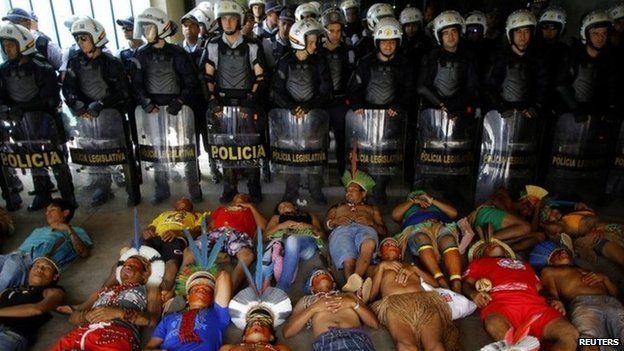Brazil indigenous group clashes with police in Congress
- Published

Brazilian indigenous protesters armed with bows and arrows have clashed with police inside the National Congress building in the capital, Brasilia.
The group, with some 30 men, tried to break into the building to protest against a bill on indigenous lands.
Police officers used pepper spray and blocked access to a committee that was due to vote on the proposal.
An arrow struck a policeman's boot but he was uninjured, said the Brazilian authorities.
Following the brief confrontation, the committee session was called off.
Four indigenous men have been detained and taken to a police station for questioning.
They are suspected of throwing arrows at police officers at a side entrance to the Congress building.
'Undemocratic decision'
The bill, known as PEC 215/00, would give the Brazilian Congress powers to demarcate the indigenous lands.
The 1988 Constitution gave the indigenous groups rights over their ancestral lands.
But many indigenous areas, especially in western Brazil and the Amazon region, have been occupied by farmers and loggers.
Indigenous leaders would prefer the indigenous agency, Funai, to retain a prominent role in the demarcation of their ancestral lands.
They say wealthy landowners and loggers have too much power and influence in the National Congress.
One of the main supporters of the constitutional amendment, Senator Katia Abreu, says Funai's role in undemocratic.
"The decisions on demarcations are taken by a lone anthropologist after hearing the indigenous groups. The National Congress, which is elected by the people, is not consulted," she told Folha de Sao Paulo newspaper last year.
The main problem indigenous groups face in Brazil, she added, "is not the lack of land, but the lack of support from Funai on health and education".
She says indigenous people account for only 1% of the Brazilian population but are entitled to 12% of the country's territory.
- Published19 April 2013
- Published28 February 2014
- Published5 September 2014